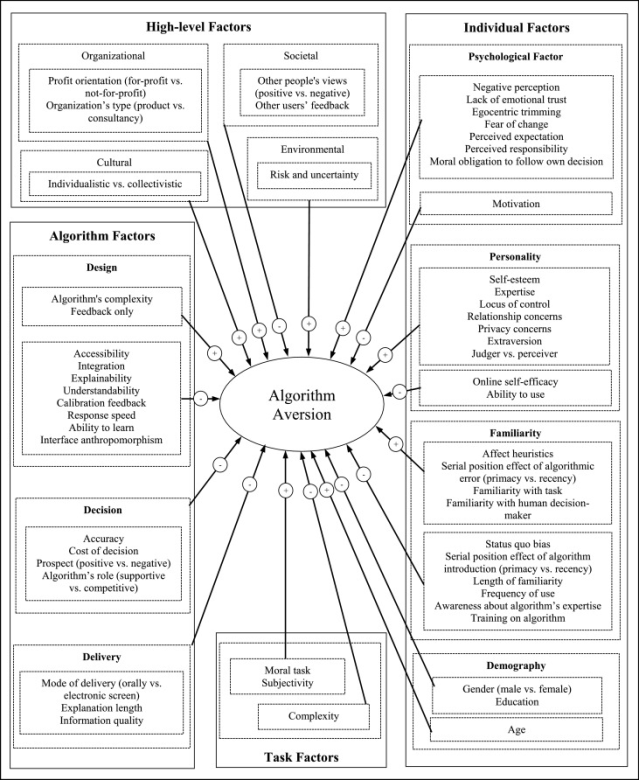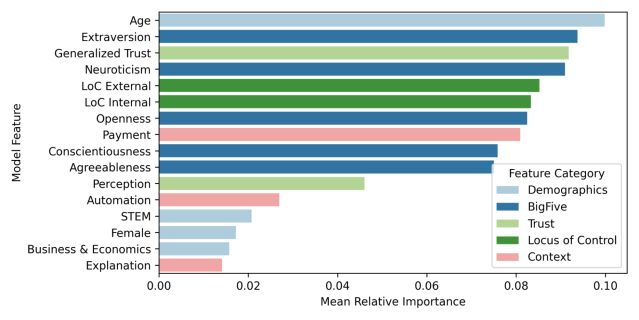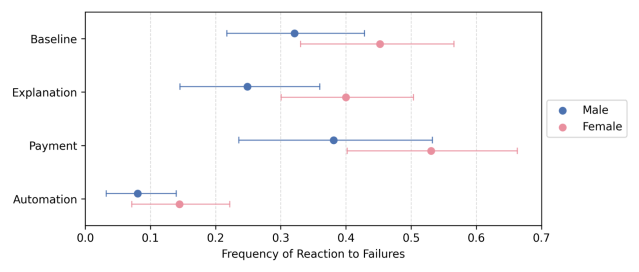Trust
Algorithm Aversion: Who Trusts Algorithms to Make Decisions?
Algorithms are everywhere, yet we still distrust algorithmic advice.
Updated May 1, 2024 Reviewed by Devon Frye
Key points
- People often distrust algorithms due to "algorithm aversion," even when they outperform humans.
- In one study, age, extraversion, and trust were the most significant factors influencing algorithm aversion.
- Women delegated to algorithms less often and reacted more strongly to algorithmic mistakes compared to men.
- Transparency boosted algorithm trust, while costs decreased it, showing the sensitivity to value and fairness.
This post was co-authored by Vinícius Ferraz, Chief Data & AI Officer at ILI.DIGITAL AG.
In today's world, algorithms are everywhere—curating our Spotify playlists, suggesting YouTube videos, and even helping us make financial decisions. But despite their prevalence and power, many of us are still hesitant to fully rely on them. Researchers call this "algorithm aversion"; we tend to distrust algorithmic advice even when it outperforms human judgment.
What Factors Drive Distrust of Algorithms?
One review of personal and contextual factors has suggested that distrust of algorithms is driven by many different factors, outlined in the table below.

To better understand the personal and contextual factors that influence algorithmic aversion, Vinicius Ferraz and a team of researchers at Heidelberg University, and Rhine-Waal University recently conducted a study using a controlled online environment.
In this study, participants were asked to make a series of decisions, choosing among three options that offered different financial rewards. The goal was to consistently select the option with the highest payout. This task was well-suited for an algorithm with reinforcement learning capabilities, which could learn from previous decisions to make optimal choices.
At each decision point, participants had two choices: They could either make the decision independently or delegate the decision-making to the algorithm. By observing the participants' behavior and analyzing the factors that influenced their decision to trust or distrust the algorithm, the researchers aimed to gain insights into the underlying causes of algorithmic aversion.
The Findings
They found that the most significant factors were age, extraversion, and generalized trust.

Three of the more interesting findings are discussed in more detail below.
The Role of Personality
From a demographic perspective, age emerged as a significant predictor of algorithm aversion, with younger participants showing a greater propensity to trust and delegate to AI. Specific personality traits also significantly influenced the interaction.
Participants high in extraversion and openness—traits linked to a willingness to explore new experiences—were more likely to delegate decisions to algorithms, viewing AI as an enhancement to their decision-making processes. Conversely, those with high levels of neuroticism, characterized by anxiety and a propensity for worry, showed a strong aversion, likely due to fears of negative outcomes and a lack of control over automated decisions.
The Role of Gender
The study highlighted a gender divide: Women not only delegated decisions less frequently on average, but also tended to react more strongly than men when the algorithm made mistakes. This could stem from higher expectations that automated systems should perform reliably.

The Role of Context
Trust in algorithms increased when participants were provided clear explanations about how the algorithms functioned. This transparency allowed users to understand and rationalize the AI's decision-making process, resulting in a higher propensity to delegate decisions compared to the baseline. Even more pronounced was the effect of automation, where the algorithm took over the entire task effort, significantly boosting delegation rates as participants appreciated the convenience and efficiency of full automation.
However, introducing a cost for using the AI, even a symbolic one, led to a stark decrease in trust. The payment group showed much lower levels of delegation, highlighting the sensitivity of trust to perceived value and fairness.
Looking Ahead
We are on the brink of a future heavily influenced by AI; therefore, it is increasingly important that we understand the factors that influence engagement with AI. By fostering a better understanding of algorithm aversion and its underlying causes, we can design better AI systems and prepare society to interact more effectively with them.
Follow MIT FutureTech if you are interested in understanding the drivers of progress in computation and AI and the related social implications.
References
Hasan Mahmud, A.K.M. Najmul Islam, Syed Ishtiaque Ahmed, Kari Smolander, What influences algorithmic decision-making? A systematic literature review on algorithm aversion, Technological Forecasting and Social Change, Volume 175, 2022, 121390, ISSN 0040-1625, https://doi.org/10.1016/j.techfore.2021.121390. (https://www.sciencedirect.com/science/article/pii/S0040162521008210)
Vinicius Ferraz, Leon Houf, Thomas Pitz, Christiane Schwieren1 Jorn Sickmann Trust in the Machine: How Contextual Factors and Personality Traits Shape Algorithm Aversion and Collaboration https://www.vinicius-ferraz.com/_files/ugd/f7ec38_8add9879fb234d378141f…
Dietvorst, B. J., Simmons, J. P., & Massey, C. (2015). Algorithm aversion: People erroneously avoid algorithms after seeing them err. Journal of Experimental Psychology: General, 144(1), 114–126. https://doi.org/10.1037/xge0000033


